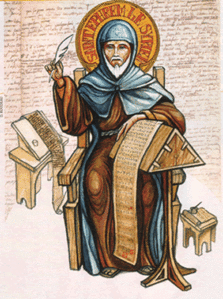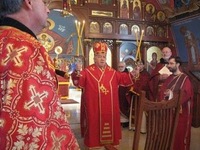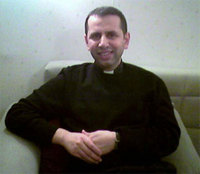 It is indeed fitting to honor the blessed deacon of
Edessa for his desire that the preaching of the divine word and the training of
his disciples rest on the purity of Sacred Scripture. He also acquired honor as
a Christian musician and poet. He was so accomplished in both arts that he was
called the "lyre of the Holy Spirit." From this, Venerable Brothers,
you can learn what arts promote the knowledge of sacred things. Ephrem lived
among people whose nature was attracted by the sweetness of poetry and music.
The heretics of the second century after Christ used these same allurements to
skillfully disseminate their errors. Therefore Ephrem, like youthful David
killing the giant Goliath with his own sword, opposed art with art and clothed
Catholic doctrine in melody and rhythm. These he diligently taught to boys and
girls, so that eventually all the people learned them. In this fashion he not
only renewed the education of the faithful in Christian doctrine and supported
their piety with the spirit of the sacred liturgy, but also happily kept
creeping heresy at bay.
It is indeed fitting to honor the blessed deacon of
Edessa for his desire that the preaching of the divine word and the training of
his disciples rest on the purity of Sacred Scripture. He also acquired honor as
a Christian musician and poet. He was so accomplished in both arts that he was
called the "lyre of the Holy Spirit." From this, Venerable Brothers,
you can learn what arts promote the knowledge of sacred things. Ephrem lived
among people whose nature was attracted by the sweetness of poetry and music.
The heretics of the second century after Christ used these same allurements to
skillfully disseminate their errors. Therefore Ephrem, like youthful David
killing the giant Goliath with his own sword, opposed art with art and clothed
Catholic doctrine in melody and rhythm. These he diligently taught to boys and
girls, so that eventually all the people learned them. In this fashion he not
only renewed the education of the faithful in Christian doctrine and supported
their piety with the spirit of the sacred liturgy, but also happily kept
creeping heresy at bay.
The artistry introduced by Blessed Ephrem added dignity
to sacred matters as Theodoretus stresses. The metric rhythm, which our saint
popularized, was widely propagated both among the Greeks and the Latins. Indeed
does it seem probable that the liturgical antiphonary with its songs and
processions, introduced at Constantinople in the works of Chrysostom and at
Milan by Ambrose (whence it spread throughout all of Italy), was the work of
some other author? For the "custom of Eastern rhythm" deeply moved
the catechumen Augustine in northern Italy; Gregory the Great improved it and
we use it in a more advanced form. Critics acknowledge that that "same
Eastern rhythm" had it origins in Ephrem's Syrian antiphonary.
It is no
wonder then that many of the Fathers of the Church stress the authority of St.
Ephrem. Nyssenus says of his writings, "Studying the Old and New
Scriptures most thoroughly, he interpreted them accurately, word for word; and
what was hidden and concealed, from the very creation of the world to the last
book of grace, he illumined with commentaries, using the light of the
Spirit." And Chrysostom: "The great Ephrem is scourge of the
slothful, consoler of the afflicted, educator, instructor and exhorter of
youth, mirror of monks, leader of penitents, goad and sting of heretics,
reservoir of virtues, and the home and lodging of the Holy Spirit." Certainly
nothing greater can be said in praise of a man who, however, seemed so small in
his own eyes that he claimed to be the least of all and a most vile sinner"
(12-14).
 After struggling with Leukemia Metropolitan Basil Myron Schott, OFM, died this morning. He was 71. I have fond memories of meeting the archbishop and always found him to be a kind and holy man.
After struggling with Leukemia Metropolitan Basil Myron Schott, OFM, died this morning. He was 71. I have fond memories of meeting the archbishop and always found him to be a kind and holy man.


